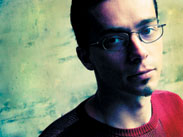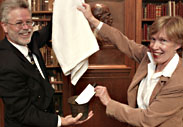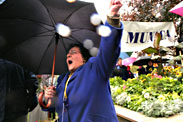In focus
Félix-Antoine Boudreault: A future force
Interviewing Félix-Antoine Boudreault is a bit like hanging out with a movie star. On at least two occasions during a half-hour chat in the engineering cafeteria, the Master's student in civil engineering had to take calls on his cell phone: "No, that's with Radio-Canada. This one is for La Presse... yeah, I'm doing an interview with the McGill Reporter right now."

Claudio Calligaris
The reason for Boudreault's sudden fame is that the 26 year old was named Personalité par excellence by the Forces Avenir awards foundation -- the grand prize of the annual gala celebration of students who are making the world a better place. The prize is worth $15,000.
Boudreault was recognized for his overseas development work, much of which was in Africa. As an undergraduate at École Technologie Supérieure, he took an opportunity to work in Ghana.
"I grew up a lot in those four months," he said.
No wonder. Boudreault explained that when he arrived in Ghana, there was no job there for him to do. He had to find his own project and ended up working for the Ghanian Ministry of Works and Housing, participating in projects as diverse as new drainage systems and port facility improvements.
"It was pretty harsh conditions, and we were only getting $15 dollars a month. I lived with a family there and picked up a bit of the language," he said.
It was tough, but not tough enough to scare Boudreault off, because he returned to Africa the next year, and then again in 2002. In total, he's lived and worked in Ghana, Togo, Cameroon and the Central African Republic (not to mention France, Poland and Guatemala).
After his first trip in Ghana, Boudreault used some of the contacts he developed and managed to get a job through the AFD (France's international development agency) building bridges. His responsibilities included hiring staff and subcontractors, and managing the project.
It wasn't easy -- finding skilled labour was a challenge, and most materials needed to be imported. Worse yet, while working in the Central African Republic last year, there was a coup.
"The new government came to us and said they wanted money from us if we wanted to continue to work," said Boudreault. That project had to be abandoned, and has still not been completed.
Despite the setbacks, Boudreault gets a lot of satisfaction from using his engineering skills in less developed countries.
"Here, as an engineer, you look to ameliorate the luxury of the people -- more towers, more buildings. There, you're building the first hospital, the first school," he said.
One of his favourite memories of his time in Africa was seeing villagers use his bridge for the first time, and being able to trade with their neighbours across the river: "You realize you've changed something."
Boudreault plans to continue his overseas work. He's already spent four weeks in Guatemala, and is working on his Spanish. However, he doesn't want to devote his life to working in developing countries.
"I met a lot of people who had been working over there for 25 years -- they've become tropicalized, they can't go back to developed countries," he explained.

Sleep can rescue memories that have spontaneously deteriorated.

For the GlaxoSmithKline vaccines clinical working group meeting held in Montreal, Craig Laferriere -- the company's therapy area leader of vaccines for Canada -- organized a pilgrimage to the resting place of Sir William Osler. Here, Laferriere unveils a donation of $1,000, happily received by Osler librarian Pam Miller on October 15.

It's who we are.
Despite the cold, blowing rain, hundreds of MUNACA members turned up at the Roddick Gates on October 21 to express their displeasure with the administration's position on contract negotiation. Chanting slogans and wielding placards, the demonstrators marched from the gates to demonstrate in front of the James Administration building. MUNACA represents 1,500 clerical and technical staff, library assistants and nurses. The university is asking staff to work more hours and has proposed eliminating some paid holidays.

Caps off to Chomski
At the age of 64, Claude Chomski may well be the oldest graduate at this year's fall convocation. He's also probably the only one receiving a BA who is entitled to be addressed as "Doctor."
Chomski already has quite a few educational credentials under his belt: a PhD in metallurgy, language certificates, a diploma in management... the list goes on. This year he adds a Bachelor's in Jewish Studies with a minor in Art History. He is graduating, he is proud to note, with distinction.
His latest degree came about almost by accident, after taking a number of intensive Hebrew courses.
"I started to take a course here and a course there, and suddenly realized I had 24 credits," he recalled.
Though Chomski had taught as a sessional instructor at McGill in the seventies, his degrees were from the University of Paris. On October 23 he will join his two sons as McGill alumnae (they have degrees in commerce and chemistry: his wife works in the Faculty of Management).
He has nothing but praise for his latest alma mater.
"I got much better marks than I did as a youngster," he said. "I got great support from my teachers, who were always available."
He doesn't rule out continuing his academic pursuits, and promises that if he does so it will be at McGill.
"I really have a soft spot for McGill -- it's a university I greatly admire."
